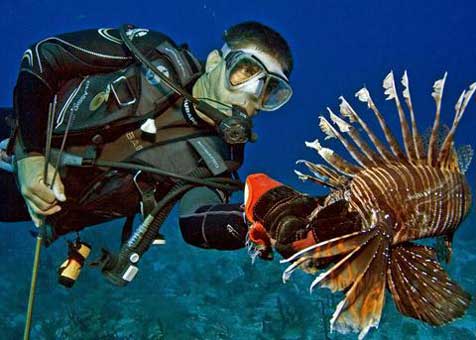
Reef Special Projects Director Lad Akins harvests an eating-size Pterois lionfish.
This article is from the Coral Magazine
Even as new sightings of Pterois spp. lionfishes are coming in from such far-flung places as Alabama, Belize, the Florida Keys, and the Dutch Antilles, a Key Largo-based coral reef education group has released a new Lionfish Cookbook with the motto of “Eat ’em to beat ’em!”
“It’s absolutely good eating—a delicacy. It’s delicately flavored white meat, very buttery,” says Lad Akins, director of special projects for the Key Largo, Florida-based Reef Environmental Education Foundation (REEF). Akins authored the 126-page cookbook along with a professional chef, Tricia Ferguson.
“The lionfish cookbook not only offers 45 great recipes,” he says, ” but it also gives detailed information on the background of the invasion, lionfish biology/ecology and impacts and how to effectively collect and handle lionfish.” REEF says that they borrowed the “Eat ’em to beat ’em” slogan from lionfish activists in Bermuda, one of many islands trying promote the lionfish as a delicacy and worthy target for commercial and sport fishermen and divers with spearguns.
Lionfish, native to the Indo-Pacific, are the first non-native marine fish to successfully invade Atlantic, Caribbean and Gulf of Mexico waters. Lionfish densities in the Caribbean, Gulf of Mexico, and the East Coast of the United States are on the rise due to their lack of predators and prolific, year-round reproduction. Thriving lionfish populations pose a serious risk to marine ecosystems through their predation on native marinelife, including both commercially and ecologically important species.
Many countries are encouraging consumption of lionfish to create demand and incentive for lionfish removals.
Proceeds from the sale of this book will support REEF’s marine conservation and lionfish research and removal programs. Books are available directly from REEF or from Amazon.
Meanwhile, Pamela Schofield, Ph.D., who tracks the spreading lionfish invasion for the US Geological Survey, has published a paper in the journal Aquatic Invasions documenting the geographic spread of Pterois volitans and P. miles in the Western Atlantic and Caribbean region.
“The invasion of lionfishes throughout the western North Atlantic Ocean and Caribbean Sea is unprecedented. Lionfishes are the first nonnative marine fishes to establish in the region and they have spread with remarkable speed. Scientists are concerned that predatory lionfishes may have detrimental impacts on native fauna, and many countries are actively involved in controlling lionfish numbers. Research on the impacts of the invasion is needed to evaluate the effect this non-native species is having on native ecosystems.
“Additionally, more work is needed to find means for controlling their numbers. Although lionfishes are not likely to be eradicated, their invasion of the Atlantic and Caribbean may serve as an example of the relatively short time required by non-native fishes to establish and spread in novel marine waters. Over 30 species of non-native marine fishes (most from the Indo-Pacific) have been documented in the coastal waters off Florida, USA (Schofield et al. 2009).” [Coral Magazine]
Download the Aquatic Invasions full paper, with maps, here.
Lionfish Cookbook
Tricia Ferguson and Lad Akins, Photography by David Stone
$16.95
